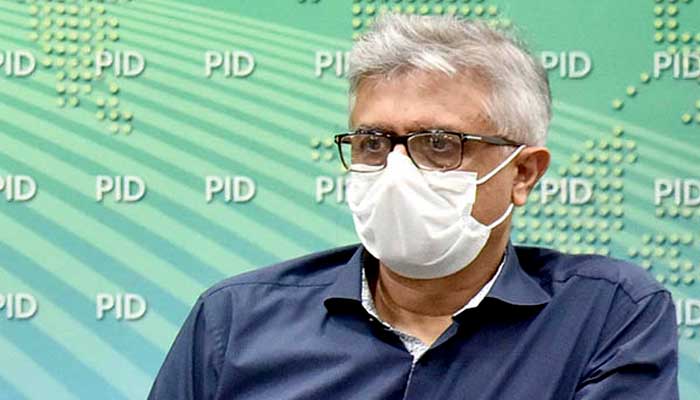As Eid approaches, Dr Faisal Sultan warns Pakistanis of a 'very risky period'
Coronavirus curve flattening in Punjab and KP, however, cases are on the rise in Sindh, says Dr Faisal Sultan
May 07, 2021

- Dr Sultan says there are "initial signs of stability" in the third coronavirus wave.
- Warns masses against getting complacent.
- Coronavirus cases in Sindh on the rise, says Dr Faisal Sultan.
ISLAMABAD: Special Assistant to the Prime Minister on Health Dr Faisal Sultan on Thursday warned Pakistanis of a "very risky period ahead" as Ramadan comes to an end and the days of Eid-ul-Fitr holidays approach.
The prime minister's aide acknowledged there were "initial signs of some stability" during the coronavirus pandemic but cautioned people against taking the infection lightly.
"We are today in the midst of the third wave of Covid-19 pandemic and while there may be very initial signs of some stability (in the third wave), these are very early days and this is a very risky period for us as the holy month of Ramazan is going to end and Eid is approaching," he said during a webinar.
He called on microbiologists and scientists to keep warning people about the dangers of the coronavirus and encourage them to keep following the standard operating procedures for safety against the infection.
The webinar, titled SOPs and vaccination: Solution for the Covid-19 Pandemic, was attended by microbiologists, molecular biologists, medical professionals and students from Pakistan as well as abroad.
Coronavirus cases on the rise in Sindh
Speaking about Punjab, Dr Sultan said the curve is flattening in Punjab and the same was the case in Khyber Pakhtunkhwa. However, he said coronavirus cases were on the rise in Sindh due to low compliance of SOPs by the masses, adding that now was not the time to get complacent as Pakistan still had more than 5,200 in critical care.
"Covid-19 cases may rise again if precautions are not taken during this critical period when we are seeing the last days of the holy month of Ramazan and Eid is a festive season," he said.
In response to a question, he said the government was concentrating on getting those vaccinated first who were the most vulnerable group. "Our first and foremost priority was to protect those who were at the greatest risk of dying. The second and concurrent objective was to protect individuals and to have enough immune people to allow reduced transmission of the disease," he added.
Speaking about the availability of vaccines, Dr Sultan rejected the perception that there were "millions of doses of the vaccine" are available, especially for private import.
He said even the COVAX alliance was unable to secure the vaccine for low-income countries, adding that Pakistan was in contact with Chinese manufacturers to ensure Pakistan met its coronavirus vaccine demands.
Over 100 die from coronavirus in Pakistan on Wednesday
On Thursday, Pakistan reported 108 deaths from the coronavirus, taking the total death toll to 18,537 as the country grapples with the third wave of the coronavirus.
According to the official data provided by National Command and Operation Centre (NCOC) on Thursday, 4,198 cases were reported when 46,467 tests were conducted across the country in the past 24 hours.
The positivity rate of coronavirus cases was recorded at 9.03%.
The number of active cases stood at 84,172, with the nationwide recoveries rising to 743,124 a day earlier.
Moreover, about 5,624 coronavirus patients are admitted to 631 various hospitals with 651 patients on ventilators across the country.











